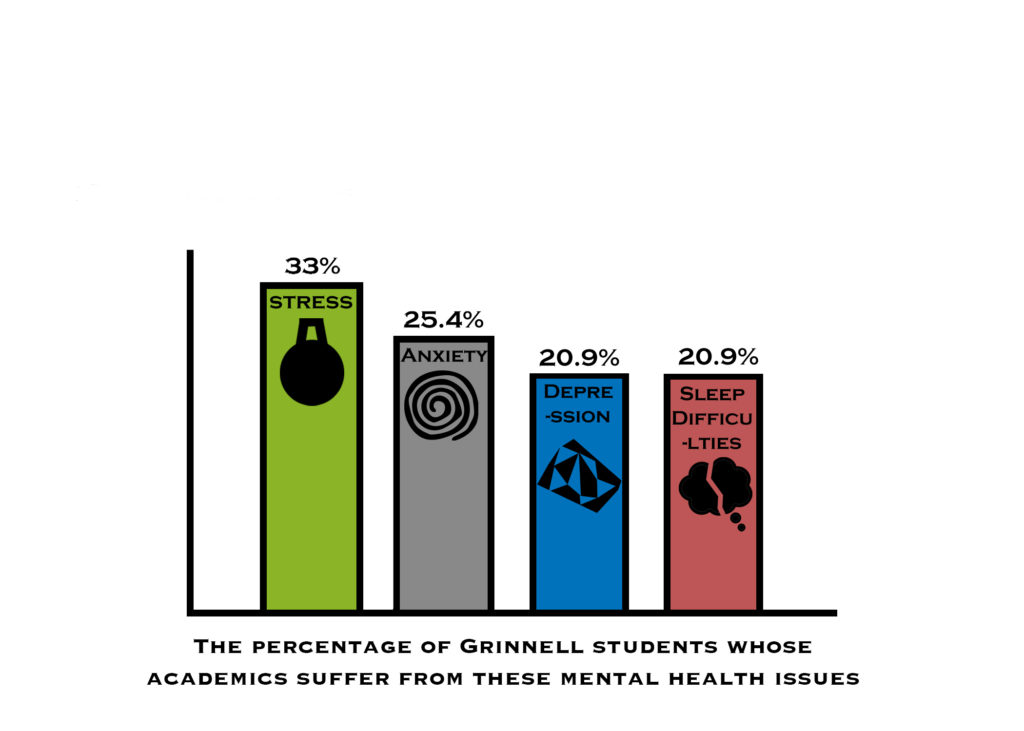Student Health and Counselling Services (SHACS) is becoming Student Health and Wellness (SHAW), but a shiny new acronym is only the beginning. Recently, the Student Mental Health Task Force published a report outlining the state of student mental health on campus. Based on assessments gathered from multiple data sources, the report highlights recommendations made by the task force for improving and expanding health and wellness services at Grinnell.
According to research cited in the report, there have been an increasing number of students experiencing mental health diagnoses on college campuses since 2000. Grinnell is no exception; data from Grinnell’s Office of Analytical Support and Institutional Research suggests that students’ reported rates of anxiety and depression are actually higher than those found on other campuses.
Grinnell’s rural location makes it more difficult for students to seek mental health care off campus. Additionally, as the report states, “the College’s intense and demanding academic atmosphere has continued to place strain on students, many of whom struggle to find healthy ways to relieve stress and anxiety.” According to the report, unhealthy coping mechanisms may contribute to mental health issues.
In 2016, Raynard Kington created the Student Mental Health Care Task Force, charging it with analyzing and recommending solutions based on mental health promotion models, current College and community resources as well as innovation and research to understand and serve mental health needs at small colleges. The task force included fourteen members belonging to the College community and was co-chaired by Angela Voos, Vice President for Strategic Planning and Chief of Staff, and Michael Latham, Vice President for Academic Affairs and Dean of the College.
The multi-authored report focused on two main areas: the College’s mental health services model, and the promotion of mental health and wellness. During the first two years of the task force, an analysis of the campus atmosphere in relation to mental health was conducted using a wide variety of data, including data on the College’s health service model, national undergraduate population data, Institutional Research data on students’ mental health experiences, and an external review of the College’s student mental health services. Strategy recommendations were formulated following the analysis. After final edits were made by Voos and Latham, the report was released.
Outlined in the report are some important – and troubling – findings about mental health and wellness at Grinnell. Overwhelming experiences of anxiety and depression are affecting the academic performance of Grinnell students and undoubtedly other areas of their lives. Additionally, drug and alcohol use and a lack of sufficient sleep are reported to impact—and be impacted by—students’ mental health. Fortunately, the task force also found a significant willingness of Grinnell students to seek assistance from SHAW counseling services, even as they were found to be in short supply.
In the meantime, the task force has already begun improving mental health services on campus. VP for Strategic Planning Angela Voos commended President Kington’s plan for implementation of early steps towards health service integration. “When there’s obvious things that need to be done, things can happen. You don’t have to wait for three years, wait for the recommendations, then do the implementation. There was a lot of important work done during the task force.”
These early steps include the formation of an integrated student health and wellness model (SHAW) and the creation of a Dean of Student Health and Wellness. In addition to new group therapy sessions, a newly developed partnership with the University of Iowa has introduced telepsychiatry services to supplement the shortage of psychiatry providers in Grinnell. The College has also increased spending towards mental health services in the past five years, from $226,000 to $605,000.
The principal recommendation of the task force, as stated in the report, is that Grinnell College must “make a renewed, sustained, and broad commitment to student mental health.” The report elaborates, emphasizing the need for an integrated approach including professional treatment services, mental health education programming, and a shift towards the promotion of positive health and wellness within the campus culture. As part of the transition to a “holistic, student-centered approach to health services,” SHAW will be moving to Mears Cottage when the HSSC campus plan is completed, in order to house physical health, mental health, and wellness services in a centralized location.
Going forward, the College will be focusing on the implementation of the task force’s recommendations. Following the recent resignation of Dean of Health and Wellness Eric Wood, a new dean will be appointed who will co-lead the implementation with the Associate Vice President of Student Affairs. A complete list of the task force’s recommendations can be found on the College’s website, or in the recently sent Special Campus Memo.
In an email to the S&B, Jen Jacobsen ’95, Assistant Dean for Health and Wellness, said that listening to feedback from the campus community on the task force’s findings is the next plan of action. Additionally, Jacobsen will be co-leading a summer faculty workshop with associate professor of psychology (and task force member) Andi Tracy ’99 on the role of faculty in supporting students’ well-being.
The report encourages continued research, analysis, and discussion of student mental health at Grinnell. Voos emphasized that further attention to the topic of student mental health is crucial. “One of the key recommendations is continued attention to this issue. We don’t have this solved. This is a big issue, and we need to continue to attend to it, to understand, to continue with assessment.”




























































